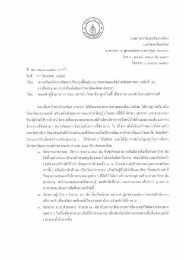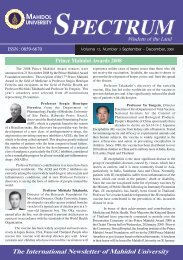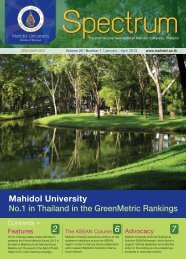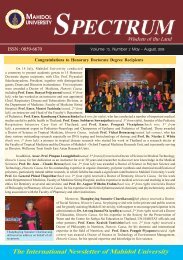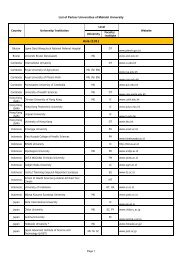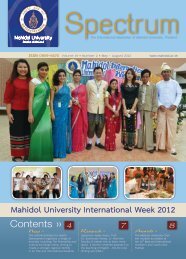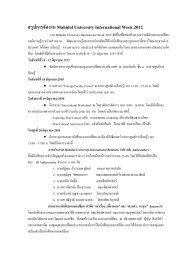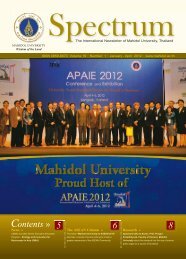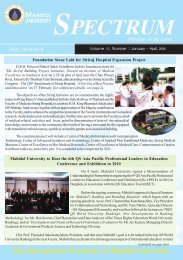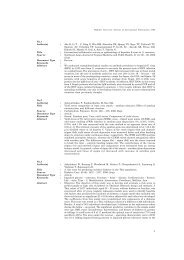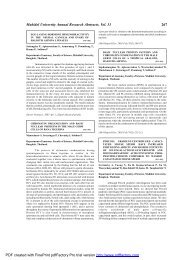Volume 19 Number 3 (September - December 2012) - Mahidol ...
Volume 19 Number 3 (September - December 2012) - Mahidol ...
Volume 19 Number 3 (September - December 2012) - Mahidol ...
Create successful ePaper yourself
Turn your PDF publications into a flip-book with our unique Google optimized e-Paper software.
<strong>Mahidol</strong><br />
University’s<br />
Faculty of<br />
Medicine Siriraj<br />
Hospital has<br />
become the first<br />
medical facility in<br />
Southeast Asia<br />
to perform robotic surgery on patients<br />
with partial knee-joint problems.<br />
Talking to Spectrum, Assoc. Prof. Keerati<br />
Charoencholvanich M.D, Orthopaedic<br />
Surgeon, Adult Reconstrutive Surgery<br />
Department of Orthopaedic Surgery,<br />
explained the main advantages of this<br />
procedure, describing how the surgery<br />
is more accurate, convenient and quicker<br />
than traditional forms of surgery.<br />
The robotic equipment has three<br />
main components – a camera, to view<br />
the surgery in real-time; a computer, to<br />
calculate how and where to make cuts;<br />
and a robotic arm under the control of<br />
the surgeons. The procedure is referred<br />
to as a “semi-active”, as even though robotic<br />
The controversial practice of<br />
removing the eyestalk of female<br />
black tiger shrimp (Penaeus monodon) in<br />
the aquaculture industry (eyestalk ablation)<br />
could soon be over if a new technique<br />
to stimulate ovarian maturation and<br />
spawning developed by a molecular<br />
biologist at <strong>Mahidol</strong> University proves to<br />
be a viable alternative.<br />
Traditionally, female shrimp have had<br />
their eyestalks removed to dispose of<br />
a gland that produces gonad-inhibiting<br />
hormone (GIH) which controls ovarian<br />
maturation. Unfortunately, this procedure<br />
quickly exhausts the female broodstock,<br />
increases production costs, and attracts<br />
accusations of cruelty. Due to the<br />
lack of alternatives, the practice has<br />
continued. However, this situation may<br />
change thanks to researchers at the<br />
Institute of Molecular Biosciences-<br />
Assoc. Prof. Dr. Apinunt Udomkit, and<br />
2 • <strong>September</strong> - <strong>December</strong> <strong>2012</strong>, Vol. <strong>19</strong>, No. 3<br />
Siriraj Hospital - A Pioneer In<br />
Robotic Knee Surgery<br />
equipment is used, it is monitored<br />
and controlled by experienced<br />
orthopaedic surgeons. Crucially,<br />
robotic surgery reduces the chance<br />
of errors being made and leads to<br />
more precise incisions and cuts to the<br />
bone and reduced damage to surrounding<br />
tissues. Furthermore, as robotic surgery<br />
tends to leave behind a much smaller<br />
wound, patients also recuperate more<br />
quickly and are able to perform routine<br />
activities shortly after their procedure. In<br />
fact, they typically maintain a wide-range<br />
of motion that is remarkably similar to<br />
healthy people.<br />
The use of this technology will<br />
undoubtedly bring enormous benefits to<br />
people suffering from problems with their<br />
knee-joints; it also reinforces the Department’s,<br />
the Faculty of Medicine Siriraj Hospital’s<br />
reputation as a premier centre of<br />
Humane Technique for use in<br />
Shrimp Farming<br />
Dr. Supattra Treerattrakool, who have<br />
developed a strategy to induce<br />
reproductive maturation in adult female<br />
P. monodon by working at the molecular<br />
level to block the activity of the GIH. Assoc.<br />
Prof. Udomkit and Dr.Treerattrakool<br />
hope this technique will make the removal<br />
of eyestalks redundant.<br />
This innovation could provide<br />
significant benefits for shrimp farmers<br />
as it would automatically reduce the use<br />
of both wild caught and domesticated<br />
female broodstock and therefore cut<br />
the production costs involved in breeding<br />
shrimp. Another potential benefit is that<br />
female broodstock could be kept in<br />
captivity for longer periods. This would<br />
allow for the identification of good<br />
breeders which could be selectively<br />
bred to supply high-quality seed for the<br />
aquaculture industry. Both aspects could<br />
have huge commercial benefits for the<br />
Thai and global aquaculture industry.<br />
orthopaedic surgery within the region.<br />
In order to help promote the use of<br />
this technology and to mark the 48 th<br />
anniversary of Department of Orthopaedic<br />
Surgery, the hospital is offering special<br />
discounts of up to 50% for 48 patients<br />
who opt for this pioneering form of<br />
surgery.<br />
For more information about The Faculty<br />
of Medicine Siriraj Hospital, including<br />
more news plus contact details, please<br />
visit http://www.si.mahidol.ac.th/eng/<br />
Shrimp have become one of the Thailand’s<br />
top ten export products, worth an<br />
estimated 50 billion Thai Baht (almost<br />
US$ 1.6 billion) annually.<br />
Dr. Treerattrakool adds that “The strategy<br />
would benefit the long-term sustainability<br />
of the country’s black tiger shrimp industry<br />
and increase its competitiveness in the<br />
global market.”



